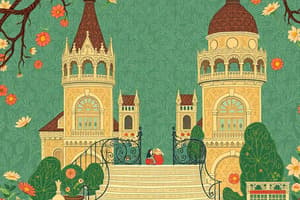Podcast
Questions and Answers
Quelle période a introduit des réformes démocratiques radicales en France et a mené à l'établissement d'un État moderne et laïc?
Quelle période a introduit des réformes démocratiques radicales en France et a mené à l'établissement d'un État moderne et laïc?
- L'Empire de Napoléon Bonaparte
- La Révolution Française (correct)
- L'Ère de l'après Seconde Guerre mondiale
- La Révolution Industrielle
Quel empereur français a élargi le territoire français et influencé la mise en place d'un puissant empire européen?
Quel empereur français a élargi le territoire français et influencé la mise en place d'un puissant empire européen?
- Louis XVI
- Napoléon Bonaparte (correct)
- Philippe Pétain
- Charles de Gaulle
Quel événement historique a amené à l'émergence de nombreuses nations indépendantes suite à la Seconde Guerre mondiale?
Quel événement historique a amené à l'émergence de nombreuses nations indépendantes suite à la Seconde Guerre mondiale?
- La Révolution Industrielle
- La Révolution Française
- Les efforts de décolonisation (correct)
- L'empire colonial français
Quel événement historique a transformé les industries et la vie urbaine en France au 19e siècle?
Quel événement historique a transformé les industries et la vie urbaine en France au 19e siècle?
Quel groupe de personnes ont joué des rôles cruciaux dans l'influence intellectuelle en France et en Europe?
Quel groupe de personnes ont joué des rôles cruciaux dans l'influence intellectuelle en France et en Europe?
Quelle ville est devenue un centre culturel et commercial important, attirant des innovateurs du monde entier au 19e siècle?
Quelle ville est devenue un centre culturel et commercial important, attirant des innovateurs du monde entier au 19e siècle?
Quelle région a été conquise par les Romains et a contribué à la formation de la civilisation française antique ?
Quelle région a été conquise par les Romains et a contribué à la formation de la civilisation française antique ?
Quelle période a vu l'émergence de la dynastie des Capétiens et la consolidation du pouvoir royal en France ?
Quelle période a vu l'émergence de la dynastie des Capétiens et la consolidation du pouvoir royal en France ?
Quelle période a connu un renouveau d'intérêt pour les idées et les arts classiques, menant à des avancées significatives dans la littérature, la philosophie et la science en France ?
Quelle période a connu un renouveau d'intérêt pour les idées et les arts classiques, menant à des avancées significatives dans la littérature, la philosophie et la science en France ?
Quels peuples habitaient la région de la France actuelle avant l'arrivée des Romains ?
Quels peuples habitaient la région de la France actuelle avant l'arrivée des Romains ?
Quelle période a vu l'établissement du système féodal en France, mais aussi des échanges culturels avec d'autres régions comme l'Italie et l'Espagne ?
Quelle période a vu l'établissement du système féodal en France, mais aussi des échanges culturels avec d'autres régions comme l'Italie et l'Espagne ?
Quel événement historique a marqué le début de la civilisation française ancienne ?
Quel événement historique a marqué le début de la civilisation française ancienne ?
Flashcards are hidden until you start studying
Study Notes
French Civilization: From Antiquity to Modern Times
Introduction
As a pivotal part of Western civilization, French civilization has undergone significant transformations throughout history. From its origins in antiquity to the rise of the modern era, French humanities have shaped the nation's identity and global standing. This article explores some critical aspects of French civilization, particularly its history.
Ancient History
Before the rise of the great Roman Empire, the region now known as France was inhabited by Celts and Germanic tribes. However, the area's history began with the arrival of the Romans, who conquered Gaul and established the province of Gallia. Over time, the Latin language and Roman customs spread, contributing significantly to the formation of early French civilization.
Medieval Period
In the Middle Ages, the Frankish kings consolidated power in the northern regions of present-day France, creating the Kingdom of France. The Capetians ruled during this period, laying the foundation for centralized governance and setting the stage for future developments. Despite the establishment of feudalism, the medieval period saw cultural exchange between French territories and neighboring regions, including Italy and Spain.
Renaissance and Beyond
The Renaissance brought renewed interest in classical ideas and arts, leading to significant advancements in literature, philosophy, and science. French scholars, writers, and artists played crucial roles in the movement, influencing both local and European intellectual circles. During this time, the French language evolved rapidly, becoming the lingua franca for high culture and diplomacy across Europe.
The French Revolution and Napoleon Bonaparte
The late 18th century witnessed one of the most transformative periods in French history: the French Revolution. This period introduced sweeping democratic reforms, abolished feudal privileges, and led to the establishment of a modern, secular state. Napoleon Bonaparte rose to prominence during this time, eventually becoming Emperor of the French in 1804. His military campaigns expanded French territory and influence, laying the groundwork for a powerful European empire.
Industrialization and Modernization
The Industrial Revolution brought significant changes to France, as new technologies and manufacturing processes transformed industries and urban life. Paris emerged as both a cultural and commercial hub, attracting innovators and entrepreneurs from all corners of the globe. Throughout the 19th and early 20th centuries, French culture continued to shape Europe, shaping the way people viewed arts, literature, and philosophy.
French Colonial Empires
Expansionist ideals and geopolitical ambitions led France to establish colonies worldwide. These territories included North America (present-day Canada), Southeast Asia, Africa, and the Pacific Islands. French colonial rule imposed a uniform administrative structure and promoted a shared cultural identity among disparate populations.
Post-World War II Era
After World War II, France entered a period of rebuilding and reinvention. De Gaulle's leadership helped restore pride in the nation's heritage and foster a spirit of unity among French citizens. Meanwhile, decolonization efforts led to the emergence of numerous independent nations, transforming the global landscape and reshaping France's place within it.
Conclusion
French civilization's evolution reflects broader trends in European and world history. Through periods of colonization, revolution, industrialization, and modernization, the French people have adapted and resiliently navigated the complexities of their history. Their contributions to art, literature, philosophy, and science continue to resonate worldwide, making French civilization a vital component of the larger tapestry of human achievement.
Studying That Suits You
Use AI to generate personalized quizzes and flashcards to suit your learning preferences.




